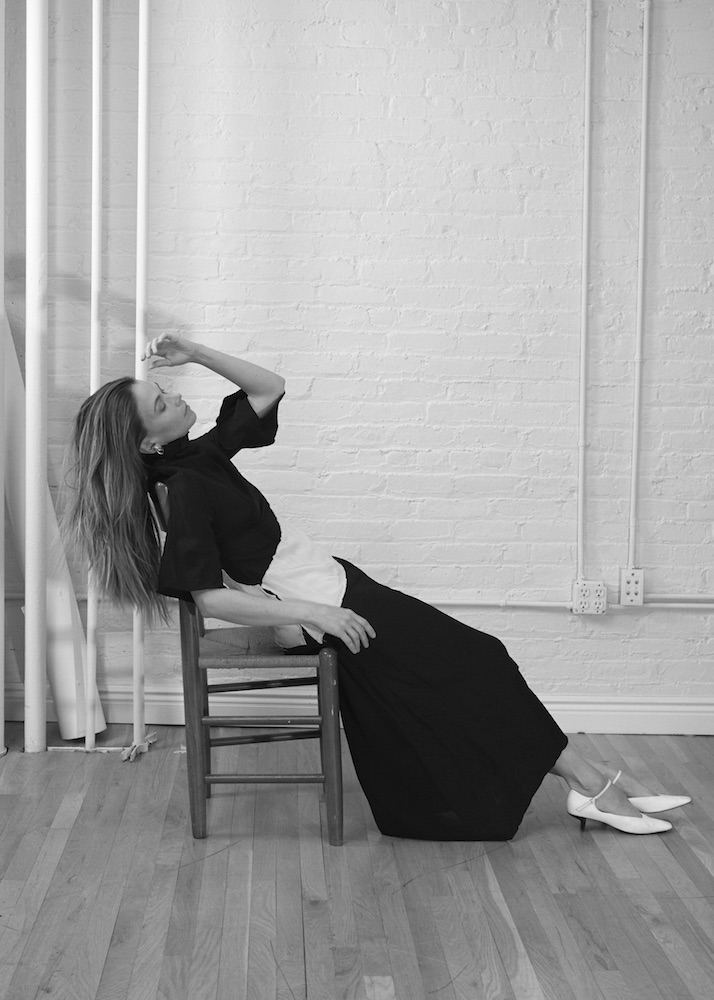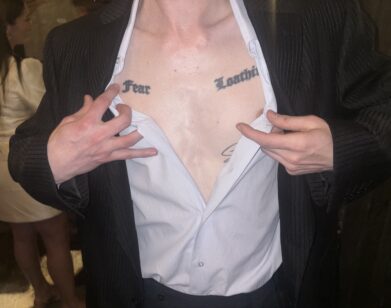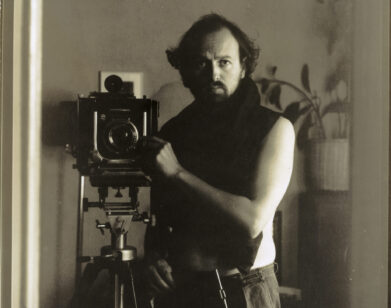Younger’s Sutton Foster isn’tafraid to win all the awards
“I don’t know why I love you so much,” jokes showrunner and producer Amy Sherman-Palladino while interviewing her friend Sutton Foster. “You have this fairy-dust effect on people that I’m not even sure you know about,” she says with a laugh.
In Younger, Darren Starr’s TV Land comedy, Foster plays Liza, a woman in her early 40s who pretends to be 26 after being turned down for a series of jobs. It’s a risky premise, and one that, in the hands of another actor, could easily have fallen flat. But Foster, a Broadway veteran with two Tony Awards and a further four nominations, brings a charming optimism to Liza. Now, nearing the end of its fourth season and with a fifth confirmed, Younger has a devoted following.
Born in Georgia and raised in Michigan, Foster appeared as a singer on Star Search when she was just a teenager and has spent much of her career in musical theater. Based in New York, she became a Broadway star 15 years ago after being promoted from an understudy to the lead in Thoroughly Modern Millie. Her first television role as a series regular was in Sherman-Palladino’s much-loved, but short-lived series Bunheads in 2012. Though she’s appeared in popular programs such as The Good Wife, and recently in the revival of Sherman-Palladino’s Gilmore Girls: A Year in the Life, Younger is her only her second leading role on the silver screen.
AMY SHERMAN-PALLADINO: Okay, Sutton, these will be hard-hitting questions. Very 60 Minutes. When did you learn to crochet?
SUTTON FOSTER: Honestly, just now as I was waiting for you to call I was crocheting and finishing up an episode of Gilmore Girls. It’s my happy place.
SHERMAN-PALLADINO: That’s the glamorous world of Sutton Foster?
FOSTER: It’s very glamorous. I taught myself how to do it when I was a teenager. I’ve always been super crafty. I’ve always loved to draw and make stuff, and I thought it would be a nice hobby. I used to cross-stitch because my mom cross-stitched. I’ve made tons of blankets. I usually do it while I’m working, especially on a TV job where there’s tons of down time and you’re just sitting there.
SHERMAN-PALLADINO: I don’t know if you do it on Younger because you have to be younger, but on Bunheads, you had that weird thing where, after we cut, you would go off to your little chair in the corner and eat your weird nut bar and crochet. Nobody could talk to you until you were ready to go back to work. People would walk around you going, “It’s Sutton’s ‘me’ time—it’s her crocheting and nut bar time.” Do you still do that, or was that exclusively for me? I just want to know.
FOSTER: I just think I’m painfully socially awkward. I still do the exact same thing. I still have my snack and craft time. It keeps me sane. I have my little craft bag that I bring with me to set everywhere I go.
SHERMAN-PALLADINO: Needles and nut bars. That should be the name of your autobiography. So tell me, Sutton, with your rags-to-ritches, ridiculous, 42nd Street, I’m the understudy and I go on to be the lead and win the Tony, overnight sensation story, does anyone on Broadway still talk to you? Are you secretly a marked woman when you walk down 42nd Street? That’s how I picture it: there’s a target on your head and every time you walk past the [Ethel] Barrymore [Theatre], five people come out wishing you’d trip and fall in front of a truck. Is that not the way it is?
FOSTER: [laughs] I hope not. This is why I hide in the corner and crochet.
SHERMAN-PALLADINO: I can’t get the swing and the understudy straight. [For Thoroughly Modern Millie], you were the understudy—you were in the show, but you would understudy if someone broke a leg and go on that night?
FOSTER: Yeah. There’s an understudy—most of the time it’s someone who’s part of the ensemble—and whoever they’re understudying, they will go on for that person. Then you have a swing and a standby, people who are back behind the scenes and who are not on stage every night. There’s a male swing and a female swing, and they’ll cover all of the male ensemble parts and all of the female ensemble parts. Usually you have someone, a standby, who’s just hired to cover the leading lady or the leading man, and that’s the person who will normally go on first. But for Thoroughly Modern Millie, we were out of town, and we just had understudies, so everybody who was in the ensemble covered one of the lead characters. I was just cast as an understudy. Originally I had auditioned for the role of Millie, but didn’t get hired. I auditioned, like, six times. I was young; I was 25 years old. I was super green and super naive. I always said I had a lot of raw talent, a lot of energy, but really no finesse or training. When I wasn’t cast, I called my agent and I said that if they needed an understudy, I’d be happy to do it.
I had been on the road with Les Mis, and Les Mis offered me the role of Éponine on Broadway. My agent was like, “You can go out of town and be an understudy and in the ensemble, or you can be on Broadway.” I said, “I think I want to do Millie.” And my agent was like, “What?” Honestly, I was dating this guy who lived in Los Angeles, and Millie was going to be in San Diego, so I was like, “Oh, if I do Millie, I’ll be closer to him.”
SHERMAN-PALLADINO: [laughs] You’re such a girl!
FOSTER: Even though that relationship did not work out, obviously, I have to thank him, because part of the reason why I took that job was so that I could be closer to that guy.
SHERMAN-PALLADINO: [laughs] That’s a part of the story I didn’t know. Did you ever run into the girl you replaced [in Millie] on the street? Is that why you crochet, so that you have a needle at all times just in case you run into her? Do you need to be armed?
FOSTER: What’s amazing is she and I grew up together. Erin Dilly is her name. She lived in Michigan and we did shows together as kids, which is wild. There was no animosity, because it wasn’t anyone’s fault, it was just a weird thing. But Erin and I are very friendly. I was kind of freaked out, because I didn’t know why they were doing what they were doing. I think Erin is one of the most talented people I’ve ever known, so I was bawling: “Why are you doing this?” Even though it was such an amazing opportunity for me, I was so confused about why it was happening: “You’re making a mistake!”
SHERMAN-PALLADINO: I love that you tried to talk them out of it. So you had this early ridiculous theater job, and then, when you were suddenly like, “I’m in between Tony-nominated parts, so now I’m going to do TV,” you got two series right away. You realize you probably should be the most hated person on the face of this earth. You’ve earned the right for most of show business to despise you. I just want you to know that. It just doesn’t happen like that, Sutton Foster. It just doesn’t work out that way.
When you go do your teaching things, because I know you still believe that there’s hope in the world and that the youth isn’t going to completely sell us out and fuck us, and you look at shining young faces, do you couch your story in any sort of way? Do you just tell them and say, ‘And it will not happen to you’?”
FOSTER: Everyone’s like, “How do you do it?” And I’m like, “Everyone’s journey is different.” Obviously with mine, I’ve had some amazing breaks, but then you have to be ready to seize the moment when the timing and the luck line up. You can’t be afraid. You have to be open. I feel like I’ve always been a leaper, and I’ve always leapt into things without thinking.
SHERMAN-PALLADINO: You’re fearless. I don’t know if you’re consciously fearless, but you’re fearless. How do you teach these young fuckers how to be fearless? Can you teach that? Because fear is a thing that will kill you in this business.
FOSTER: I think a lot of it is inherent. On paper, it looks like I just had all of these yeses and everything has just worked out, but for every “yes” and every job that I’ve gotten, there are 10 or 20 that I didn’t get. If I had let all of those defeats define me or deflate me or stop me in my tracks, or every bad review, or every crap note… I think that’s inherent in me.
SHERMAN-PALLADINO: It’s because you’re not of this earth. You’re 90% elf.
FOSTER: I always say, “Don’t let a ‘no’ or even a dismissal defeat you, let it be the fire that makes you want to go, ‘Fuck you.'” Every time someone says, “No,” that makes me even more determined. That’s one of the things I want to try to teach young people. Oddly, the other thing I want to teach the young people is to get a hobby. That’s what I first say: “Do something that brings you happiness other than this business, because this business is so fickle.” I make blankets and stuffed animals. I don’t know. I’m a weirdo.
SHERMAN-PALLADINO: You are. You’re a complete weirdo. That’s why I love you. I’ve always said you’re half muppet. There’s something very strange about you. You were built in Jim Henson’s factory before HBO got it. Is your kid going into show business and ballet class?
FOSTER: I don’t know yet. We’ll see. She’s only five months old.
SHERMAN-PALLADINO: That’s time. She should be en pointe right now.
FOSTER: I’m going to throw everything at her and we’ll see what she likes. The one thing I know she likes is music. She loves music. But she is very independent already, and I have a feeling she’ll make it very clear what she likes and what she doesn’t. I’ll keep you posted.
SHERMAN-PALLADINO: I personally believe that every child should be forced into ballet class until they’re, like, 13. I think there should be a law. Then if they want to quit, they can quit. Because you deal with these young actors, and they don’t know how to walk; they don’t know how to sit on a piece of furniture. You’re like, “Take two steps to the left,” and they don’t know what their left is. I’m a big believer in it. That’s my cause. The whole universe is fucked, so I’m just focusing on everyone going to ballet class. I think that’s going to turn out really well for me.
What’s going on with Hunter?
FOSTER: My brother?
SHERMAN-PALLADINO: Yes! Didn’t you sleep on his couch and that’s where you were when you got your first gig? You quit school, went to be a waitress, and got a bad hair cut—a bowl cut—and then you went back to New York and slept on Hunter’s couch and got Grease?
FOSTER: Oh my God. Yes. My brother is about six years older and I’ve always looked up to him. He’s doing really well. He’s killing it. He’s not doing so much acting right now; he’s really transitioning more into writing and directing.
When I was 19, I quit college. I went to Carnegie Mellon and I dropped out and moved home with my parents, who were living in Tennessee at the time. I gained 20 pounds and I cut off all of my hair. I was just lost. I worked at the Macaroni Grill. My mom passed away a couple of years ago, and I had a real tricky relationship with my her, but one of the things that she did was she was amazingly supportive of my career and my talents. I really owe her a lot because of that. We subscribed to Backstage, and she was like, “You should fly up to New York, stay with your brother, and go on these open calls.”
SHERMAN-PALLADINO: Maybe she just wanted you out of the house.
FOSTER: I think so. I flew up to New York, lived with my brother and his then-girlfriend—they weren’t married at the time. I think they were both in that revival of Grease. This was in the ’90s, so ’95 or ’96. My brother was playing Roger in Grease on Broadway, and there was an open call for the national tour of Grease, just for a replacement. I slept on my brother’s couch and Jen [Jennifer Cody], his wife, taught me in their living room. I went to an open call, I waited outside in line for hours. Danced, sang, did the whole thing, and they cast me on the spot to go on the road.
SHERMAN-PALLADINO: It just gets worse with every story. Sorry, go ahead.
FOSTER: I was so lost and I really didn’t know what the hell I was doing, and then four days later, I was in San Francisco rehearsing for the national tour of Grease. I performed in the ensemble. I was an understudy again. I travelled all across the country, and then I eventually took over the role of Sandy on the road. Sally Struthers, who you know, was on the tour. She was playing the teacher. I turned 21 when I was on tour. We were in Rochester, New York, and I remember doing some tequila shots with Sally Struthers. She gave me these psychedelic, bell bottom pants and I had those on. It was crazy. I turned 21 with Sally Struthers.
SHERMAN-PALLADINO: There’s really no one better to turn 21 with than the lunacy that is Sally Struthers. I didn’t know that story. I love it. So what do you think, are you ever going to give up Broadway for being on TV or movies or is it always going to a mix?
FOSTER: I hope it will be a mixed bag. Everyone’s always like [puts on an old-timey accent], “What do you like better: Broadway or TV?”
SHERMAN-PALLADINO: Do they say it in that voice? It’s like Guys and Dolls all of sudden?
FOSTER: Exactly. I don’t know. I’m just trying to enjoy everything as it’s happening and navigate my career as best as I can. I’m trying to figure out how I can work with you again.
SHERMAN-PALLADINO: That’s got to be your next priority. I need to have my fix. I think that has to take precedence over all of your other decisions right now it that’s okay with you.
FOSTER: No problem.
YOUNGER AIRS WEDNESDAY NIGHTS ON TV LAND. AMY SHERMAN-PALLADINO IS AN EMMY-NOMINATED WRITER, DIRECTOR, AND PRODUCER, AND THE CREATOR OF GILMORE GIRLS AND BUNHEADS.







